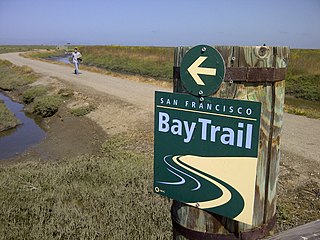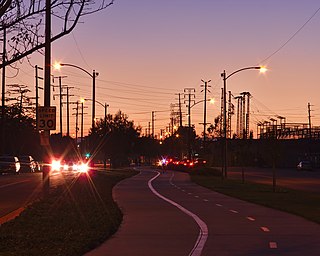
Traffic calming uses physical design and other measures to improve safety for motorists, pedestrians and cyclists. It has become a tool to combat speeding and other unsafe behaviours of drivers in the neighbourhoods. It aims to encourage safer, more responsible driving and potentially reduce traffic flow. Urban planners and traffic engineers have many strategies for traffic calming, including narrowed roads and speed humps. Such measures are common in Australia and Europe, but less so in North America. Traffic calming is a calque of the German word Verkehrsberuhigung – the term's first published use in English was in 1985 by Carmen Hass-Klau.

AC Transit is an Oakland-based public transit agency serving the western portions of Alameda and Contra Costa counties in the East Bay of the San Francisco Bay Area. AC Transit also operates "Transbay" routes across San Francisco Bay to San Francisco and selected areas in San Mateo and Santa Clara counties. AC Transit is constituted as a special district under California law. It is governed by seven elected members. It is not a part of or under the control of Alameda or Contra Costa counties or any local jurisdictions.

Pleasant Hill/Contra Costa Centre station is a Bay Area Rapid Transit (BART) station serving the Contra Costa Centre Transit Village in Contra Costa Centre, California, just north of Walnut Creek and just east of Pleasant Hill.

The San Francisco Bay Trail is a bicycle and pedestrian trail that when finished will allow continuous travel around the shoreline of San Francisco Bay. As of 2020, 356 miles (573 km) of the trail have been completed. When finished, the trail will be over 500 miles (800 km) of paved and gravel paths, bike lanes, and sidewalks, linking 47 cities across nine counties and crossing seven toll bridges. It is a project of the Association of Bay Area Governments (ABAG) and the Metropolitan Transportation Commission (MTC), in collaboration with other agencies, private companies, non-profit organizations, and advocacy groups.

People in the San Francisco Bay Area rely on a complex multimodal transportation infrastructure consisting of roads, bridges, highways, rail, tunnels, airports, seaports, and bike and pedestrian paths. The development, maintenance, and operation of these different modes of transportation are overseen by various agencies, including the California Department of Transportation (Caltrans), the Association of Bay Area Governments, San Francisco Municipal Transportation Agency, and the Metropolitan Transportation Commission. These and other organizations collectively manage several interstate highways and state routes, eight passenger rail networks, eight trans-bay bridges, transbay ferry service, local and transbay bus service, three international airports, and an extensive network of roads, tunnels, and bike paths.

Complete streets is a transportation policy and design approach that requires streets to be planned, designed, operated and maintained to enable safe, convenient and comfortable travel and access for users of all ages and abilities regardless of their mode of transportation. Complete Streets allow for safe travel by those walking, cycling, driving automobiles, riding public transportation, or delivering goods.

California Bicycle Coalition, also known as CalBike, is an advocacy organization based in Sacramento that seeks to expand bicycling in the U.S. state of California. A related organization, the California Bicycle Coalition Education Fund, conducts solely charitable functions. The California Bicycle Coalition was founded in 1994.

The Transportation and Land Use Coalition (TALC) is a non-profit organization which serves as a partnership of over 100 organizations in the San Francisco Bay Area focused on smart growth, public transportation, environmental causes, and other issues connected with transit and urban planning. TALC was founded in 1997, and is based in Oakland, California. A year after its founding, TALC's involvement in public-transportation advocacy was cited as part of a shift toward public support for increasing funding for buses, trains, and bike paths.
Los Angeles can refer to both the City of Los Angeles and Los Angeles County, as well as the larger Los Angeles region.

The Street Trust is a 501(c)(3) non-profit advocacy organization based in Portland, Oregon, United States. The Street Trust advocates for the safety and ease of biking, walking and riding public transit in communities. The organization does legislative work at the statewide and national levels and endorses legislation and ballot measures. It successfully lobbied Portland's mass transit company, TriMet, to accommodate bicycles on buses and prevailed in a lawsuit to uphold Oregon's Bicycle Bill.
Transit for Livable Communities (TLC) is a regional, nonpartisan transit, biking, walking, and development advocacy group based in St. Paul, Minnesota, USA. It was founded in 1996 by Barb Thoman and John DeWitt.

Toronto, Ontario, like many North American cities, has slowly been improving its cycling infrastructure. The number of cyclists in Toronto has been increasing progressively, particularly in the city's downtown core. As cycling conditions improve, a cycling culture has grown and alternatives such as automobiles are seen as less attractive. The politics of providing resources for cyclists, particularly dedicated bike lanes, has been contentious, particularly since the 2010s.

Cycling in San Francisco has grown in popularity in recent years, aided by improving cycling infrastructure and community support. San Francisco's compact urban form and mild climate enable cyclists to reach work, shopping, and recreational destinations quickly and comfortably. Though San Francisco's famed steep hills can make cycling difficult, many parts of the city are relatively flat, including some of the most densely populated. However, heavy automobile traffic, the lack of bike lanes on many streets, and difficulty in crossing major streets deter most residents from cycling frequently in San Francisco.
Like many metropolitan regions in the United States, the San Francisco Bay Area is politically fragmented into many local jurisdictions. There is one regional transportation planning agency, the Metropolitan Transportation Commission, but there are 9 counties, 85 cities, and 16 towns, each separately responsible for making bicycle infrastructure improvements. A few of these jurisdictions publish and implement their own bicycle plans, while most defer this responsibility to the county or the region in which they are situated. Written bicycle plans are required to qualify for many sources of funding from regional, state, and federal agencies.

The National Association of City Transportation Officials (NACTO) is a coalition of the Departments of Transportation in North American cities.
Bay Area Bike to Work Day is an annual Bike-to-Work Day event held in the San Francisco Bay Area encouraging and promoting bicycle commuting. The event is an initiative of the Metropolitan Transportation Commission, and supported by local partners including the San Francisco Bicycle Coalition, Bike East Bay, Silicon Valley Bicycle Coalition, Marin County Bicycle Coalition, Napa County Bicycle Coalition, and Sonoma County Bicycle Coalition. Up through 2019, the Bay Area celebration was a week earlier than the national US Bike to Work Day. After limited events in 2020-2021 due to the COVID-19 pandemic, the date for 2022 onward was changed to the third Friday of May, to match the nation-wide practice.

San Jose, California has various cycling routes on roads and trails used by both commuters and recreational riders. The city has plans to expand the current 285 miles (459 km) of bike lanes to 400 miles (640 km), and the current 60 miles (97 km) of trails to 100 miles (160 km). San Jose was ranked as a bronze-level bicycle-friendly community by the League of American Bicyclists.

The Expo Line Bikeway is a 12-mile (19 km) Los Angeles County, California rail with trail bicycle path and pedestrian route that travels roughly parallel to the Metro's E Line train tracks between the Exposition Park area near the USC campus and downtown Santa Monica near the Pacific Ocean. The Expo Line Bikeway is one of two major bicycle routes in Los Angeles that share dedicated rights-of-way with mass transit, the other being the Orange Line Bikeway in the San Fernando Valley.

The Chandler Boulevard Bike Path is a Class I rail trail off-street bike route that runs from North Hollywood to Burbank in Los Angeles County, California.















